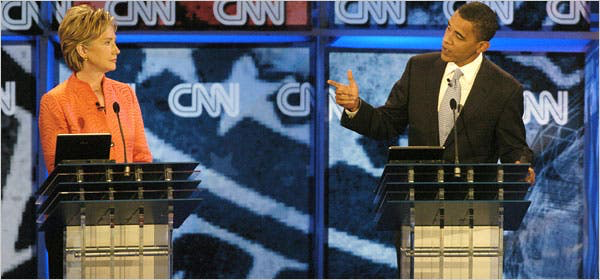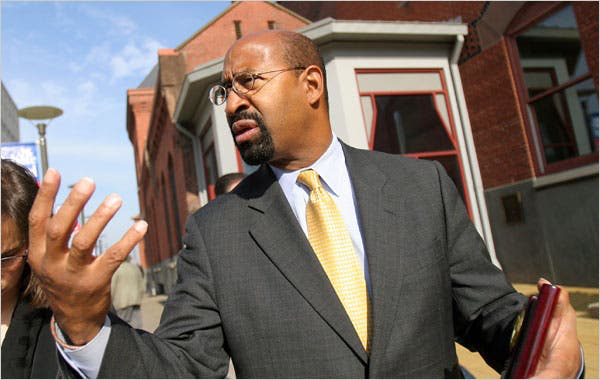Howard Dean, the chairman of the DNC, the man who is supposed to be looking out for Democrats, says, “I think there is 800 [superdelegates], and 450 have already said who they are for. I would like the other 350 to say who they are for at some point between now and the first of July, so we don’t have to take it to the convention.”
Mort Kondrake, who would love to see an Obama candidacy, says, “The only way out of this that I can see, since there is not going to be a re-do in Michigan or Florida, is for somebody, and Phil Gretason [sic], the governor of Tennessee is trying to organize this, is a pre-convention of the super delegates—get them all together and have them decide.”
A “pre-convention”? Conventions are not supposed to be public relations affairs where the party parades around looking as if it’s unified. We don’t want stage-crafted “democracy.” Conventions are where issues are discussed and the candidate that stands the best chance of being elected president and who best represents the interests of Democratic voters is selected. Liberal elites are desperate to bring the election to a close because they’re scared witless that, by August, Obama will have self-destructed, denying them the claim of the first African American presidential candidate.

Ending the primary is not what Democratic voters want. As Clinton has pointed out, two-thirds of Democrats in a recent poll want the primary process to work itself out through voting. There are millions of people who haven’t yet voted, and they want their say. Of those who want the race to end, the same percentage of Democrats want Obama to drop out of the race as want Clinton to drop out of the race. The party should take note of this fact, because, coupled with the one-third of Clinton supporters who say they will switch to McCain if Obama wins the nomination, it signals how many Democrats are worried about an Obama candidacy.
* * *
Very interesting story out today by ABC news on Philadelphia mayor Michael Nutter. I don’t agree with everything he said, but I greatly admire his standing up for substance over symbolism. He says in no uncertain language that he would have left Trinity United over Jeremiah Wright’s teachings. “I could not sit and tolerate that kind of language, and especially over a very long period of time,” he said. “If I were in my own church and heard my pastor saying some of those kinds of things, we’d have a conversation about what’s going on here, what is this all about, and then I would have to make my own personal decision about whether or not to be associated or affiliated.” When asked if he would have quit, he answered, “Absolutely.”

He talked about the pressure from the black community, pressure that has already caused prominent members of the black community to switch their vote to Obama. The most disappointing defector to the Obama camp was House member John Lewis, who admitted that he switched because of anger and harassment from the black community. Nutter said that he hears all the time, “Why not support a brother?” He answers, “Somehow, someway, for some people there’s an automatic assumption that a mayor who is African American or some other elected official has to support another African American.”
As for the possibility of an historic moment, he added, “Certainly the opportunity to demonstrate to my 13-year-old daughter that there is a bright future for her, that a woman could get elected president of the United States, is equally compelling.” This historic possibility has been lost on the press. Black men got the right to vote in 1870. It would take another fifty years for women—all women—to get the right to vote. There’s no rule that says race comes before gender in “historic firsts.”
Nutter said, “Either candidate will clearly make history. But you only get to vote for one. The most important thing is winning in November, putting a Democrat in the White House.” He continued, “I’m a great fan of history. I don’t know that when people are struggling to pay the bills, that they ultimately conclude that, ‘Well, if we can just make history with this vote, then all of my problems will be solved.’”
Nutter condemned the Democratic Party for disenfranchising voters in Florida and Michigan, two states Clinton won by large margins. The Democratic Party is refusing to seat those delegates. “Think about who we are in the Democratic Party and the country we are in,” Nutter said. “That we would somehow leave out any of our citizens in this process, I think, would be an absolute disgrace. We need to be a bit smarter about it.”
Many in the black community are confused by Nutter’s endorsement. They thought for sure that he would support Obama. Instead of scratching their heads, however, they should listen to what he said and realize that his endorsement is rooted in reason, a commodity in short supply among those caught up in Obamamania. What Nutter says about electability is on point.
* * *
A great many democrats have been sucked into the Obama cult of personality, and, with virtually every media outlet claiming that Obama’s speech on race was historic and satisfying in terms of addressing the outstanding problems of his association with Jeremiah Wright (without going into detail about Obama’s close association with James T. Meeks and Salem Baptist and other black leaders of Wright’s ilk), it’s not particularly surprising that a majority of Democrats have come to this conclusion. After all, Obama is winning the election. Democrats needed a reason to justify their vote and the corporate media handed it to them. It’s all hunky dory now.
As for Republicans, their responses are for the most part a combination of subconscious fear of being perceived as racist by interviewers (many respondents, especially those who perceive interviewers as having reason to suspect them of racialized politics, are deceptive with interviewers in polls when race is a factor), a deep-seated hatred of Clinton that has them convinced that there is no way Clinton can be a strong candidate (they don’t know anybody who would vote for Clinton, so how could most Americans?), and a press so completely in Obama’s camp that they are convinced that McCain won’t be covered fairly in the general election if Obama is the candidate.
Given everything we can plainly see about the circumstances surrounding this poll, the results are predictable. More accurate are polls asking Clinton supporters whether they will support Obama or McCain in the event Clinton doesn’t get the nomination. The finding that one-third of Clinton supporters will support McCain given such an outcome is a much clearer indication of the possible consequences of an Obama candidacy. Numbers to this question put to the Obama side have risen of late because Obama supporters, frustrated by Clinton’s reluctance to quit in the middle of the fight, have turned on her (when the question was first asked, only a small proportion of Obama supporters would switch parties given the opposite scenario).
If the polls ever switch in Clinton’s favor, it will happen despite the overwhelming force of the corporate media’s surreal push for an Obama’s candidacy. Moreover, with Obama contributing so much money to the campaigns of superdelegates, who, more than 80 percent of the time support the candidate who contributes the most money to their campaign, it looks bleak for Clinton.
